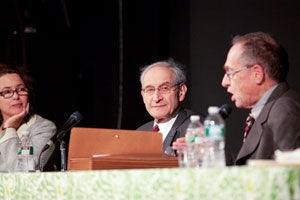Philosophy must engage the issues of its day, says Suffolk University Professor Gregory Fried, co-author with his father, Harvard Law Professor Charles Fried, of the new book “Because It Is Wrong: Torture, Privacy, and Presidential Power in the Age of Terror “(Norton 2010). And so it did on Tuesday evening, September 7, at the Brattle Theatre, in a panel discussion presented by the Harvard Bookstore. The panel featured the Frieds and Harvard Law Professor Alan Dershowitz, and was moderated by terrorism expert Jessica Stern.
Calling the book “elegant” and “moving,” Stern turned the discussion over to the Frieds, who summarized their conclusions to a full house: that torture is absolutely wrong and should never be practiced under any circumstances; that invasions of privacy can be justified and legally regulated; and that it is sometimes necessary for presidents to break the law, but the rule of law requires that they submit to the legal consequences of doing so.
Dershowitz challenged the Frieds to explain why it is wrong to torture even to obtain information that would save innocent lives. Charles Fried countered with an argument about moral agency: “We all know Lincoln’s wonderful phrase, ‘as I would not be a slave, so would I not be a master.’ I would say, as I would not be tortured, so would I not be a torturer,” he said. Gregory added, “To allow [torture] to enter into those things about which we make calculations is to put at risk some of our fundamental understandings of who we are that govern our nature as a democratic republic.”
On the question of extra-legal power, the Frieds referenced, approvingly, Jefferson and Lincoln, each of whom violated the Constitution in the name of national emergencies and sought and received retroactive ratification of their acts from Congress. Bush, they argued, did similarly, albeit reluctantly, when he violated FISA’s wiretapping rules.
Ultimately, Dershowitz homed in on an aspect of the book that close readers will notice: the authors do not deductively explain why torture is wrong. Dershowitz asserted that their abolitionist stance on torture is an intuition based in aesthetics, not morality. Early in the discussion, Charles conceded that they can’t prove why torture is subject to absolute constraint. “What we can do,” he said, “is point to aspects of it, give you pictures, give you examples, and say, ‘Surely, if this isn’t one of the constraints, what
is?’”
Dershowitz told the audience: “Please, read this book and read it actively. It is a terrific book in the sense that it’s a dynamic book, not a static book about an existing position. It’s two brilliant minds at work.”
